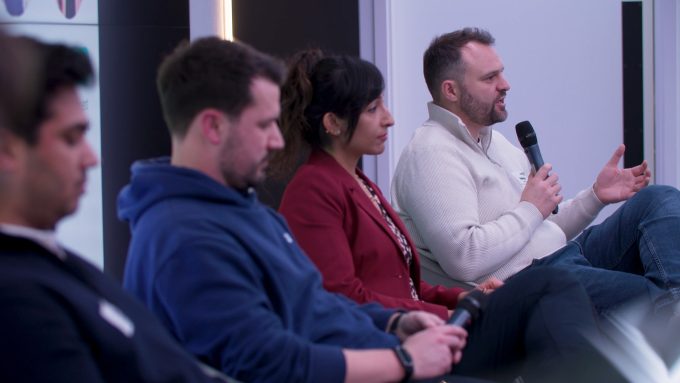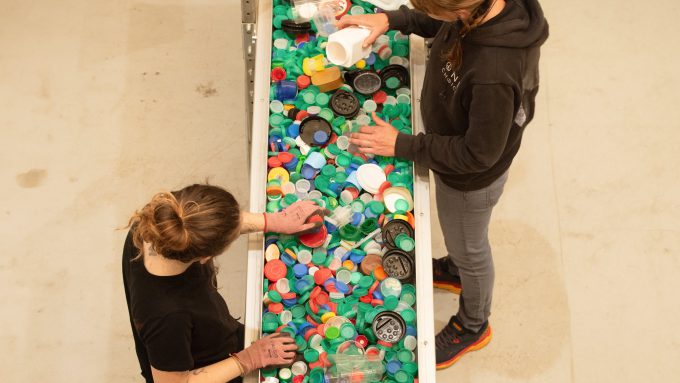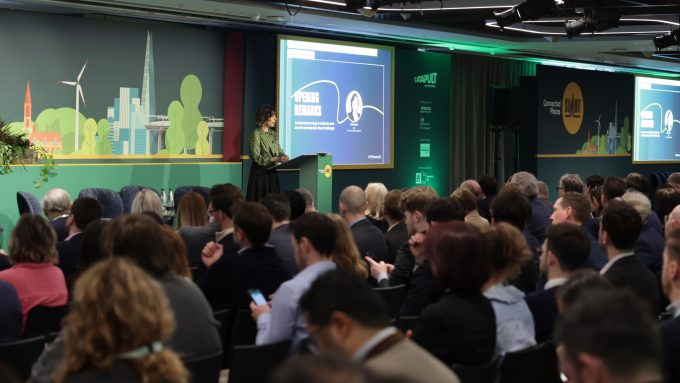
Meet the innovator powering efforts to make car batteries last longer

“Many people dream big about going to space and seeing the universe, but I dream small and want to visualise everything in detail,” says nanotechnology specialist Dr Sindy Chaves. Starting her career in medicine – researching ways of preventing disease – she is now focused on manufacturing, developing eco-friendly battery components for vehicles that last longer and can be recharged more quickly.
Sindy is the Chief Scientific Officer and one of seven co-founders of start-up firm Global Nano Network, which creates new materials for industrial applications, including a product called Hyperfoil.
Earlier this year the company took part in the Clean Futures Accelerator in the West Midlands, delivered by Connected Places Catapult alongside BCIMO and Coventry University. They received £50,000 and a business support package to help the firm create a digital twin of its manufacturing process.
The aim was to identify how best to make carbon savings and financial efficiencies during manufacture of the product, without the need to run multiple and lengthy experiments.
Sindy says the accelerator and support of the Catapult have helped the company forge new connections. “We've been introduced to a large network and welcomed lots of people to our facility to see what we do, including representatives from Coventry City Council.
“Now our name is known, we are exposed to people who can help us, make a difference, or introduce us to potential investors.”

From the Caribbean to California
Sindy was born in Costa Rica, “a country that prides itself on taking care of the environment” and remembers being told at school that pupils were lucky to live somewhere with such amazing biodiversity. “That clicked with me and has stayed in my mind ever since,” she says.
“Costa Rica is tiny and whatever we produce won’t make a big difference to the rest of the world, so I wanted to study something that could have a positive impact on sustainability at a large scale.”Dr Sindy Chaves, Chief Scientific Officer, Global Nano Network
Sindy and her family moved to America when she was 12 and she immediately noticed a cultural difference between the focus on recycling and reuse from her homeland and the “buy, buy, buy” approach in the United States. “The more I saw it, the more I realised there's a lot to be done to protect the planet.”
She also remembers hearing about the development of electric vehicles and how manufacturing processes were far from clean.
Sindy studied economics before switching to microbiology at California State University. A requirement of students to study one science-based class led her to “completely fall in love” with her new-found subject, so she “stopped what I was doing, and switched my career”.
While working towards a Masters in microbiology, Sindy followed the advice of a senior lecturer and professor to consider using her new understanding of nanotechnology to create new diagnostic tests to help prevent disease.
Her efforts in this field included helping to create a home testing kit to diagnose secondary infections that could lead to HIV, which was used in South Africa to help treat people sooner.
She continued her studies, achieving a doctorate at the University of Nevada, before returning to Costa Rica in 2012 to join the country’s Institute of Technology as a laboratory co-ordinator. Sindy later worked for the Latin University of Costa Rica as a director of research.
Her attention turned to tackling food waste and she used her knowledge of nanotechnology to help reduce the quantity of perishable products being thrown away. Alongside colleagues, she developed a ‘smart sticker’ for film packaging that changes colour only when food is past its best.

Switching her attention to batteries
Sindy wondered whether nanotechnology could be applied to vehicles too. She teamed up with her brother, an electrical engineer, and her partner, a materials science specialist, plus a former industrial engineering student from the Costa Rican Institute of Technology.
They soon got talking to specialists in the UK working on producing electric vehicle batteries and decided to work together to develop technology to improve their efficiency. Six years ago, Global Nano Network was formed and after a year in a laboratory, they settled on the formula they have today. Three years ago, it started working with Warwick University and the Warwick Manufacturing Group to conduct testing.
The company then moved to the Institute for Advanced Manufacturing and Engineering at Coventry University; one of the partners on the Clean Futures programme.
“I'm constantly thinking of ways to make things better and solve problems in a way that people don't normally consider,” says Sindy. “In my experience, it’s good to surround yourself with multiple experts.”
She adds that the company is a good example of collaboration in action, with none of the founders doing quite the same thing, but “being able to approach a problem from different angles”.
“Our aim is to reinvent the manufacturing process for batteries, create more sustainable components and impact the environment in the least possible way.”
Currently, they are focused on making one aspect of batteries – the cathode – more sustainable. “We started with the idea of creating a new type of battery using magnesium, but quickly realised that the market is not ready for that.”
The company’s Hyperfoil product is essentially a water-based coating that is applied to aluminium foil placed on a battery to slow the rate of corrosion and decrease resistance. It is now looking to raise capital to manufacture at scale, and sell its product to electric vehicle manufacturers.
Use of the product will – it is hoped – allow batteries to be charged much faster; reducing a 45 minute charging time to around 15 minutes. Sindy also says that faster charging will no doubt encourage more motorists to switch to using electric vehicles.
Focusing on the future
Success for Sindy and the company over the next few years will be to raise enough capital to be able to produce its material at scale, and to see it used in electric vehicles.
She says that innovators “need to be passionate” about perfecting their technologies in order to ride out the downs, which can be more frequent than the ups. “There’s a lot of emotion that goes into being an innovator, but if you're passionate and know that what you're doing is for the greater good, you just need to be patient and believe in the process.
“Always surround yourself with people that know more than you,” she says, adding that Connected Places Catapult “has mentors that really care about what you do”.
Moving forward, she would like industry to create more programmes focused on battery technology, and for the education sector to provide tailored courses in the subject.
“Most people working in the battery industry come from engineering, material science and the chemical sector. There are no specific courses for battery specialists, so getting universities to implement specific programmes would be great in order for more people to work in this space.”
Read about the Clean Futures programme, and the financial impact it has had for firms from cohort one.
Clean Futures is being led by Connected Places Catapult in collaboration with the Black Country Innovative Manufacturing Organisation, Coventry University and CU Services Limited. It is part of the wider West Midlands Innovation Accelerator, funded by UK Government and delivered by Innovate UK, which is designed to bolster the region’s innovation and R&D capability and spark commercial growth and investment.





